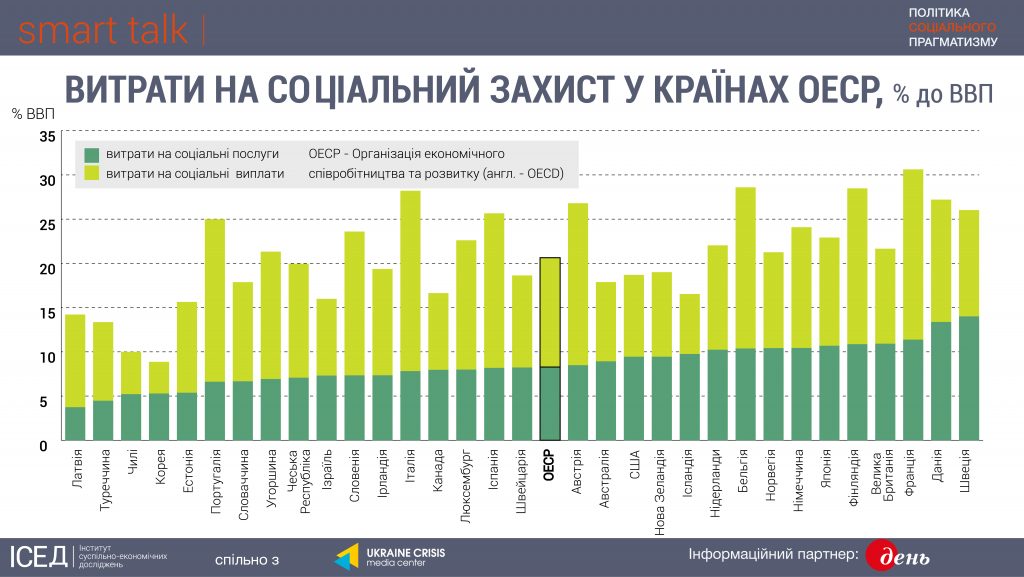Experts: The principle of “money follows the person”, “single desk”, and greater autonomy to improve the quality of social services
In order for social services in Ukraine to become more accessible and of good quality, the priority of this area should increase. Secondly, it is important to ensure the effective use of public funds allocated to it: stick to the principle of “money follows the person” and create a “single desk” for appeals. These proposals were expressed by experts during a discussion held at Ukraine Crisis Media Center, organized in partnership with the Institute for Social and Economic Research.
Social benefits or social services: what is more important?
Ukraine, unlike developed countries, directs money rather to social benefits than social services, said Marianna Onufryk, director of social programs, Institute of Social and Economic Research. The OECD (Organization for Economic Co-operation and Development) countries spent around 8.3% of GDP on social services, while Ukraine – 0.3% of GDP. In Ukraine, the total spending on social protection and social security are more or less comparable, but there is a dramatic difference in funding social services. According to the Ministry of Social Policy, about 3 million citizens use social services.
“Payments or benefits, due to their size, can only help a person maintain his/her existence. Instead, social services can provide targeted assistance, not just help people overcome a difficult life situation, but sometimes prevent falling into it. This does not mean that we should replace social benefits with social services, but we must make this social security tool a priority,” explained Ms. Onufryk. Moreover, unlike social benefits, there is a much lower risk of misusing social services money.
The strategy of social services reform provides improved administration and control, as well as expansion of social services market so that services become more accessible and of high quality. “Each person’s needs must be specified individually. We want to implement an integrated approach to solving the problem that will combine assistance and social services,” noted Oksana Sulyma, director of Department on Elderly People and Social Services, Ministry of Social Policy of Ukraine. She reminded that under decentralization all powers concerning social services had been transferred to the local level.
Recommendations
- Money must “follow the person”
Experts unanimously agree that social services need to introduce the principle of “money follows the person”. This will motivate social workers to work efficiently and seek new customers. It will also provide more efficient use of funds. For example, about 12% of the money allocated to boarding schools is now spent on children’s needs; the rest goes to maintain facilities. “The state system offers no incentive to save, to provide better services because there is no service market. The system “money follows people” is expected to create a market,” said Ihor Yakovenko, scientific consultant, Institute for Social and Economic Research. To this end, it is appropriate to give autonomy to these institutions, like it is in medicine, so that they can compete with non-governmental organizations. This is also to the advantage of most people. They will not feel dependent on the particular institution, but will know that certain funds are allotted to them, added Marianna Onufryk. “The transition to the targeting and ensuring that the service and payment are based on the assessment of needs of each family is a very important process that will hopefully be launched by this law”, noted Vasylyna Dybailo, director of partnership “Kozhniy Dytyni”. We should see to it that social services provide decent living standards rather than be government handouts.”
According to Marianna Onufryk, a network of medical and social centers should be created for people who need both treatment and social security. But this type of services has not yet been provided for in the new law on social services recently approved in the first reading.
- “Single window”
There should be a “single desk” for citizens’ appeals, from where they will be directed to a particular service provider. This is vitally important for those who belong to several categories of service recipients. In the united territorial community, a separate specialist can act as a “single window.” He will identify people who need support, and motivate them to seek service. Pilot projects in Uman and Bashtanka district (Mykolaiv region) showed that this model works, informed Olena Ivanova. Oksana Sulyma noted that the Ministry of Social Policy has transferred such recommendations regarding social workers to the local governments.
According to Olena Ivanova, nothing prevents local communities from organizing a system of social services according to model that is more profitable for them. “It is important that people also urge local leaders to make all necessary operational decisions,” added Oksana Sulyma.
- Involvement of NGOs
The function of social service providers can be transferred to public organizations, as is often done in developed countries. The first attempts have already been made. But in 2016, only UAH 800 thousand were allocated to the social order, and it was implemented only in 4 regions. According to Olena Ivanova, director of UNDP Project “Support to the Social Sector Reform in Ukraine,” one of the reasons is that the local governments still perceive this as a rather complicated task (to identify needs, priorities, budget, conduct a contest). Secondly, NGOs are not always interested to enter this market because they used to work on grant funds. “When an organization implements a grant, it is not accountable for quality of services and does not report on each recipient,” she explained.
- Communication
Blogger Tatusja Bo stressed that it is important to conduct information campaigns and give people more information about what services they can get, how, and where. In practice, it turned out that often people know nothing, especially in small villages. At the same time communities should also be informed about such their powers, and the ways of better organization, added Marianna Onufryk.
Ihor Yakovenko noted that the expert proposals should be considered in preparing the law for the second reading.




